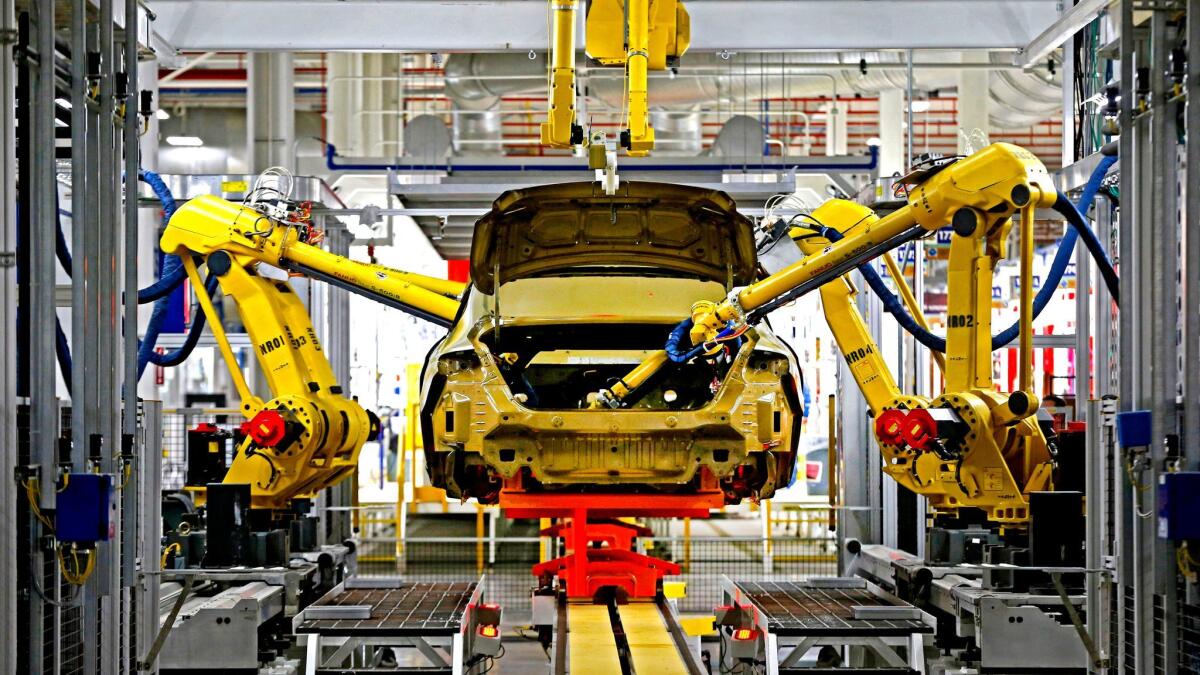Automation is likely to eliminate nearly half our jobs in the next 25 years. Here’s what to do

- Share via
A recent study from Oxford University estimated that as many as 47% of the jobs in developed nations will vanish in the next 25 years as a result of automation. These losses will be in both white- and blue-collar jobs. As a nation, we are completely unprepared for the upheaval this will create.
Decades ago, an increase in productivity and profit would have meant a rising quality of life for workers, but no longer. Automation can bring astonishing increases in productivity, but the increases in profit it brings currently benefit only a small minority. The vast majority of the spoils of automation have gone to investors and the executive classes who exert outsized economic power on our politics and markets — and therefore on our lives. This has left working people poorer, less secure and less powerful than ever. That trend will accelerate unless we act.
Today’s new technologies are not designed to make workers’ lives easier, less dangerous or more engaging. Their purpose is to enrich corporate coffers by eliminating many workers and squeezing more out of those who remain. Amazon, for example, is famous for its high-tech warehouses. Many functions have been automated, and the workers who remain are heavily monitored with new technology that can track everything from how many breaks they take to how many boxes they scan an hour. The technology can also generate warnings and even terminations for those deemed not sufficiently productive. In return for working in such rigid and grueling situations, one analysis found, Amazon warehouse workers make a median wage of $28,466 a year, while the company’s CEO, Jeff Bezos, makes $8,961,187 an hour.
This is a stark example, but speaks to an astonishing trend. In the United States, the top one-tenth of 1% of the population earns nearly as much as the bottom 90% of the population combined; its three richest people hold more wealth than the bottom 50% of the country. Across the world, seven people or families have wealth equivalent to the entire bottom half of the population, almost 4 billion people. The looming tidal wave of automation will only exacerbate this staggering inequality — unless we act.
Envisioning a future that protects the vast working and middle class from calamity will require creative solutions. Imagine, for example, if Facebook paid its users for the data they currently contribute for free. In 2018, Facebook generated $55.8 billion in revenue with a business model designed to profit from its users’ data, their posts, comments, photos and likes.
Or what if companies had incentives to use technology for their workers’ benefits rather than to eliminate jobs, monitor and squeeze profit from workers and users. In Europe, automation has traditionally been viewed as a way to improve working conditions. Swedish mine workers, for example, now use joysticks to control machinery in mines from the comfort and safety of a control room above ground — and they have held on to the generous benefits and wages they enjoyed before. How have they achieved this? Largely through the power of worker councils, employer-funded bodies that sit on the supervisory boards of European companies and have a significant say in the introduction of new technologies.
We also need to revisit the gig economy. Already, 36% of U.S. workers earn their living as contract labor. Gig work offers the seductive chance to fit work in when and where it’s convenient. But the price for this perk is painfully high: Gig workers often do not receive a living wage, healthcare, education or retirement benefits. Minimum wage laws do not adequately protect them, with some studies estimating they make less than 4$ per hour, yet they are forbidden to unionize. And to top it all off, they will probably be among the first workers replaced by robotic systems.
Places as diverse as Germany, Britain, the United States and Kenya are beginning to rethink these inequities of power. One way is through a grass-roots innovation called the “platform co-op,” which already generates more than $2.36 trillion in revenue across the globe. What are these cooperatives? Think Uber, if Uber drivers owned significant equity in the company. Think Spotify, if the music-streaming service was owned and run by musicians, record labels and fans instead of a few ultra-rich Swedish guys. There are abundant models for this, including Fairmondo, a German digital selling platform that operates much like eBay — except that the sellers on the platform are also its owners.
Another potential way of addressing the coming job loss is through basic income policies, which are already being tested in Stockton, Calif., as well as in Sweden, Finland and Spain. Under such programs, monthly sums are paid to citizens whether they work or not. These initiatives could be funded, at least partially, by the companies responsible for eliminating jobs and threatening worker security. Companies need to adhere to a social contract and acknowledge their responsibility to the country and its people.
Going forward, we will need a wide range of ways to address automation and the job loss that will accompany it. We should start with a “digital bill of rights” that includes a commitment to create technologies that serve the greater good and to rethink citizens’ roles within technology and work. As individuals trying to fight for our jobs and dignity, we are helpless. But as a collective, we can come together to design and engineer a future in which technologies serve us all.
Ramesh Srinivasan is a professor of information studies and design at UCLA and directs the UC Digital Cultures Lab. He is the author of “Beyond the Valley: How Innovators Around the World Are Overcoming Inequality and Creating the Technologies of Tomorrow.” @rameshmedia
More to Read
A cure for the common opinion
Get thought-provoking perspectives with our weekly newsletter.
You may occasionally receive promotional content from the Los Angeles Times.









